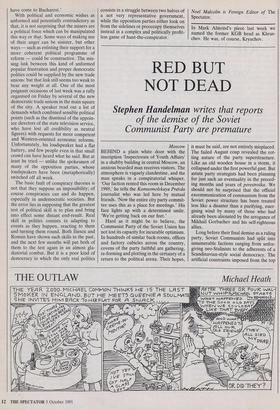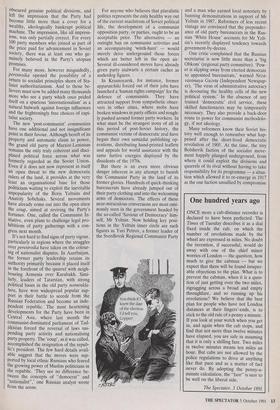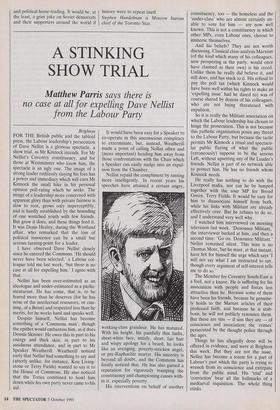RED BUT NOT DEAD
Stephen Handelman writes that reports
of the demise of the Soviet Communist Party are premature
Moscow BEHIND a plain white door with the inscription 'Inspectorate of Youth Affairs' in a shabby building in central Moscow, an anxious bearded man receives visitors. The atmosphere is vaguely clandestine, and the man speaks in a conspiratorial whisper. 'Our faction rented this room in December 1989,' he tells the Komsomolskaya Pravda journalist who was led here by mutual friends. 'Now the entire city party commit- tee uses this as a place for meetings.' His face lights up with a determined smile. 'We're getting back on our feet.'
Hard as it might be to believe, the Communist Party of the Soviet Union has not lost its capacity for incurable optimism. In hundreds of similar back-rooms, offices and factory cubicles across the country, covens of the party faithful are gathering, re-forming and plotting in the certainty of a return to the political arena. Their hopes,
it must be said, are not entirely misplaced. The failed August coup revealed the rot- ting nature of the party superstructure. Like an old wooden house in a storm, it collapsed under the first powerful gust. But astute party strategists had been planning for just such an eventuality in the preced- ing months and years of perestroika. We should not be surprised that the official excommunication of communism from the Soviet power structure has been treated less like a disaster than a purifying, ener- gising wind by many of those who had already been alienated by the arrogance of Mikhail Gorbachev and his self-righteous allies.
Long before their final demise as a ruling party, Soviet Communists had split into innumerable factions ranging from unfor- giving neo-Stalinists to the adherents of a Scandinavian-style social democracy. The artificial constraints imposed from the top obscured genuine political divisions, and left the impression that the Party had become little more than a cover for a wealthy, ideologically bankrupt political machine. The impression, like all impress- ions, was only partially correct. For every 100 party members who joined as part of the price paid for advancement in Soviet society, there was at least one who ge- nuinely believed in the Party's utopian promises.
For many more, however misguidedly, Perestroika opened the possibility of a return to socialist principles shorn of Sta- linist authoritarianism. And to those be- lievers must now be added many thousands more who see a party which once prided itself on a spurious 'internationalism' as a natural bulwark against foreign influences and the frighteningly free choices of capi- talist society.
The new 'post-communise communists have one additional and not insignificant point in their favour. Although bereft of its Property and automatic claim to power, the grand old party of Marxist-Leninism remains the only truly coherent and disci- plined political force across what was formerly regarded as the Soviet Union. Even if it does not now represent in itself an open threat to the new democratic rulers of the land, it provides at the very least an organisational base for those politicians waiting to exploit the inevitable unpopularity of the Boris Yeltsins dnd Anatoly Sobchaks. Several movements have already come out into the open since the coup, aimed at reviving the Party's fortunes. One, called the Communist In- itiative, even plans to challenge legal pro- hibitions of party gatherings with a con- gress next month.
It's not hard to find signs of party vigour, Particularly in regions where the struggles over perestroika have taken on the colour- ing of nationalist disputes. In Azerbaijan, the former party leadership retains its authority primarily because it placed itself in the forefront of the quarrel with neigh- bouring Armenia over Karabakh. Simi- larly, leaders of Tatarstan, with strong political bases in the old party nomenkla- tura, have won widespread popular sup- port in their battle to secede from the Russian Federation and become an inde- pendent republic. The most heartening developments for the Party have been in Central Asia, where last month the communist-dominated parliament of Tad- iikistan forced the reversal of laws sus- pending party activity and nationalising party property. The 'coup', as it was called, accomplished the resignation of the repub- hc's president. The few hard details avail- able suggest that the moves were sup- ported by local ethnic Russians who feared the growing power of Muslim politicians in the republic. 'They see no difference be- tween the concepts of "democrat" and 'nationalist",' one Russian analyst wrote from the scene. For anyone who believes that pluralistic politics represents the only healthy way out of the current maelstrom of Soviet political life, the development of a communist opposition party, or parties, ought to be an acceptable price. The alternative — an outright ban on communist activities and an accompanying 'witch-hunt' — would . merely drive underground those forces which are better left in the open air: Several ill-considered moves have already given party stalwarts a certain cachet as underdog figures.
In Krasnoyarsk, for instance, former apparatchiki forced out of their jobs have launched a 'human rights campaign' for the defence of communists. They have attracted support from sympathetic obser- vers in other cities, where mobs have broken windows in party offices and rough- ly pushed around former party workers. In what must be the strangest irony of all in this period of post-Soviet history, the communist victims of democratic zeal have begun their own samizdat publishing op- erations, distributing hand-printed leaflets and appeals for world assistance with the same furtive energies displayed by the dissidents of the 1970s.
But there is an even more obvious danger inherent in any attempt to banish the Communist Party in the land of its former glories. Hundreds of quick-thinking bureaucrats have already jumped out of their party clothing and into the welcoming arms of democrats. The effects of these near-miraculous conversions are most omi- nously seen in the government headed by the so-called 'Saviour of Democracy' him- self, Mr Yeltsin. Now holding key posi- tions in the Yeltsin inner circle are such figures as Yuri Petrov, a former leader of the Sverdlovsk Regional Communist Party and a man who earned local notoriety by banning demonstrations in support of Mr Yeltsin in 1987. Reformers of less recent vintage are convinced that the preponder- ance of old party bureaucrats in the Rus- sian 'White House' accounts for Mr Yelt- sin's recently displayed tendency towards govenment-by-decree.
One critic complained that the Russian secretariat is now little more than a 'big Obkom' (regional party committee). 'Pow- er is slipping away from elected democrats to appointed bureaucrats,' warned Neza- vissimaya Gazeta (Independent Newspap- er). 'The virus of administrative autocracy is devouring the healthy cells of the new political system.' In the absence of any trained 'democratic' civil service, these skilled functionaries may be temporarily necessary. They also provide a back-door route to power for communist methodolo- gy, if not ideology.
Many reformers know their Soviet his- tory well enough to remember what hap- pened after the short-lived democratic revolution of 1905. At the time, the tiny Bolshevik faction of the socialist move- ment happily plunged underground, from where it could exploit the divisions and quarrels of its rival without having to take responsibility for its programme — a situa- tion which allowed it to re-emerge in 1917 as the one faction unsullied by compromise and political horse-trading. It would be, at the least, a grim joke on Soviet democrats and their supporters around the world if history were to repeat itself.
Stephen Handelman is Moscow bureau chief of the Toronto Star.




















































 Previous page
Previous page